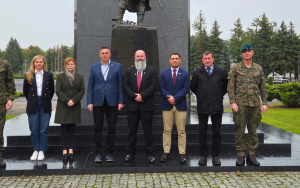
Strengthening South–South Collaboration: Insights from Reginald Kgwedi’s Visit to Universidad de los Andes
- Mr Reginald Kgwedi’s visit to UniAndes highlighted shared goals between SU and UniAndes in sustainability and innovation, fostering opportunities for joint research and co-supervision.
- The partnership shows how Global South institutions can learn from each other — as seen in South Africa’s adaptation of Bogotá’s Bus Rapid Transit model.
- Beyond academia, Mr Kgwedi’s experience in Colombia deepened his appreciation for cultural resilience and the value of partnerships built on shared values and mutual learning.
When Mr Reginald Kgwedi from Stellenbosch University’s (SU) Department of Logistics travelled to Bogotá, Colombia, he discovered more than just a new academic environment — he experienced the shared potential that connects institutions across the Global South. His visit formed part of the PhD Workshop, held from 5 to 10 October under the theme “Sustainability, Innovation and Digitalization in Emerging Markets,” hosted by Universidad de los Andes (UniAndes). The event brought together scholars from around the world to explore how collaboration between emerging economies can shape more inclusive and sustainable futures.
“My first impression of UniAndes was one of academic excellence and a vibrant learning environment like SU,” says Mr Kgwedi. “The university’s commitment to sustainability and social relevance was evident. UniAndes is embedded into the city, making it easy for the community to interact with the university population.” Situated in the heart of Bogotá, UniAndes impressed him with its openness, warmth, and sense of purpose — qualities that made the exchange both intellectually and personally enriching.
For Mr Kgwedi, the experience extended well beyond the formal sessions. “UniAndes reminded me of SU in many ways,” he reflects. “It has a dynamic atmosphere and is interdisciplinary. They encourage practical engagement with societal issues, creating fertile ground for collaboration in different areas as it is the case at SU.”
The workshop’s discussions on sustainability, innovation, and digital transformation provided rich ground for exchange among academics from various regions of the Global South. “It was an invaluable opportunity to interact with other academics working in logistics and transport,” he says. “The workshop allowed us to explore shared sustainability opportunities and challenges through a Global South lens.”
During his visit, Mr Kgwedi identified several opportunities for future collaboration — including joint research in sustainable logistics, entrepreneurship, and AI applications, as well as co-supervision of postgraduate students.
Shared Perspectives, Shared Solutions
The partnership between SU and UniAndes reflects a growing recognition that South–South collaboration is essential to addressing global challenges through locally relevant solutions. “We face similar socio-economic realities,” explains Mr Kgwedi. “This partnership represents the strength of South–South collaboration in addressing context-specific challenges. Being the best universities in the Global South, together with our shared experiences and regional knowledge, SU and UniAndes can co-develop innovative solutions that are relevant to local markets.”
He illustrates this interconnectedness through an example from his field: “South Africa drew inspiration from Bogotá’s TransMilenio Bus Rapid Transit (BRT) system, which was introduced to alleviate severe urban congestion. This model has since been adapted in major South African cities such as Cape Town (MyCiTi BRT) and Johannesburg (Rea Vaya BRT) to address similar mobility challenges. It serves as a valuable example of how countries in the Global South can learn from one another, given the similarity of their development and socio-economic challenges.”
Beyond Academia: Building Human Connections
Outside of the academic programme, Mr Kgwedi immersed himself in Colombian life and culture. From hiking 3 000 metres up Monserrate Mountain, visiting the Museo del Oro, to sampling local dishes at Bogotá’s bustling markets, he found inspiration in Colombia’s resilience and vibrant heritage. “Culturally, I was inspired by Colombia’s rich history and its resilience. Despite its history of internal conflict, the country was able to come together, rebuild and move forward,” he shares. “The experiences were exciting, humbling, and reaffirmed the importance of culture, identity, and humility.”
Looking Ahead: Collaboration with Purpose
The visit also prompted deeper academic reflection. “Academically, the experience expanded my understanding of how data-driven decision-making, climate logistics, and AI integration can advance sustainable transport systems,” he notes. “As academics, we need to understand the environment we operate in and align our research to solve societal challenges. I have also learned that it is critical to incorporate more comparative case studies from the Global South into my teaching. It also inspired a renewed focus on interdisciplinary research that bridges technology, policy, and sustainability.”
For Mr Kgwedi, the visit underscored how partnerships like the one between SU and UniAndes can shape a more connected and equitable academic landscape. Supported through SU’s International Collaboration Grant (ICG) and the Kuehne-Foundation, his visit demonstrated how such initiatives empower scholars to build meaningful networks and explore opportunities that extend beyond research — into social, cultural, and developmental impact.
His advice to fellow academics is simple but sincere: “Such collaborations are most rewarding when it is built on shared values, and mutual learning. I would encourage colleagues to approach such opportunities with openness. International collaboration should not only be about academic exchange but about building relationships.”



